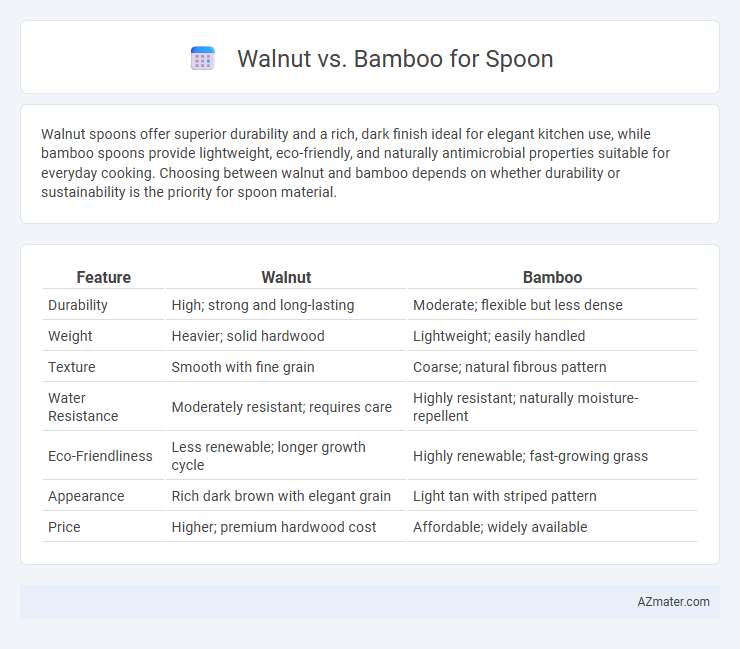Walnut spoons offer superior durability and a rich, dark finish ideal for elegant kitchen use, while bamboo spoons provide lightweight, eco-friendly, and naturally antimicrobial properties suitable for everyday cooking. Choosing between walnut and bamboo depends on whether durability or sustainability is the priority for spoon material.
Table of Comparison
| Feature | Walnut | Bamboo |
|---|---|---|
| Durability | High; strong and long-lasting | Moderate; flexible but less dense |
| Weight | Heavier; solid hardwood | Lightweight; easily handled |
| Texture | Smooth with fine grain | Coarse; natural fibrous pattern |
| Water Resistance | Moderately resistant; requires care | Highly resistant; naturally moisture-repellent |
| Eco-Friendliness | Less renewable; longer growth cycle | Highly renewable; fast-growing grass |
| Appearance | Rich dark brown with elegant grain | Light tan with striped pattern |
| Price | Higher; premium hardwood cost | Affordable; widely available |
Introduction to Walnut and Bamboo Spoons
Walnut spoons are crafted from dense hardwood known for its rich, dark brown color and natural durability, making them resistant to wear and ideal for long-term kitchen use. Bamboo spoons, derived from fast-growing, sustainable bamboo grass, offer a lightweight yet sturdy option with natural antimicrobial properties that help maintain hygiene during food preparation. Both materials provide eco-friendly choices, but walnut's robustness contrasts with bamboo's flexibility and rapid renewability.
Material Overview: Walnut vs Bamboo
Walnut wood is valued for its rich, dark color and dense, durable grain, making it ideal for high-quality, long-lasting spoons. Bamboo, a fast-growing grass, offers a lightweight, eco-friendly alternative with natural antimicrobial properties and a smooth finish. Both materials provide unique benefits: walnut excels in strength and aesthetic appeal, while bamboo emphasizes sustainability and quick renewability.
Durability Comparison: Which Lasts Longer?
Walnut spoons are known for their high density and hardness, offering excellent resistance to wear and tear during prolonged use. Bamboo spoons, while eco-friendly and lightweight, tend to be less durable due to their fibrous structure, which can lead to quicker splintering or cracking under heavy use. Walnut's robust grain structure typically ensures a longer lifespan, making it the preferred choice for durability in kitchen utensils.
Eco-Friendliness and Sustainability
Walnut spoons, sourced from hardwood, offer durability but require longer growing cycles, impacting their eco-friendliness. Bamboo spoons, made from rapidly renewable grasses, provide a highly sustainable alternative due to fast harvest rates and minimal pesticide use. Bamboo's natural biodegradability and lower carbon footprint make it a superior choice for environmentally conscious consumers.
Aesthetic Appeal: Look and Feel
Walnut spoons showcase rich, dark brown hues with intricate grain patterns that add warmth and elegance to kitchen tools. Bamboo spoons offer a lighter, natural tone with a smooth, uniform texture, providing a modern and minimalist aesthetic. The contrasting visual appeal of walnut's deep, luxurious finish versus bamboo's pale, clean look caters to diverse style preferences in kitchenware.
Safety and Food Compatibility
Walnut spoons offer excellent safety due to their natural antibacterial properties and resistance to cracking, making them highly food-compatible for stirring and serving both hot and cold dishes. Bamboo spoons are also food-safe, being naturally antimicrobial and lightweight, but they may be more prone to splintering and require careful maintenance to prevent mold growth. Both materials are eco-friendly choices, yet walnut's dense grain provides enhanced durability and a smoother surface that minimizes food absorption and bacterial buildup.
Maintenance and Care Requirements
Walnut spoons require regular oiling with food-safe mineral oil or beeswax to prevent drying and cracking, especially after frequent washing. Bamboo spoons are more resistant to moisture and bacteria due to their natural antimicrobial properties, but they should be hand-washed and dried immediately to avoid warping or splitting. Both materials avoid dishwasher use to maintain integrity, but walnut demands more consistent conditioning for long-term durability.
Cost and Affordability
Walnut spoons generally come with a higher price tag due to the wood's density, rich color, and durability, making them a premium choice for kitchenware. Bamboo spoons are more affordable and widely available because bamboo grows rapidly and is easier to harvest, which reduces production costs. For budget-conscious buyers, bamboo offers a cost-effective option without sacrificing functionality, while walnut provides a longer-lasting, more elegant alternative at a greater investment.
Best Use Cases for Walnut and Bamboo Spoons
Walnut spoons are best suited for serving and stirring delicate dishes due to their sturdy yet smooth grain, which resists water absorption and minimizes flavor transfer. Bamboo spoons excel in high-moisture environments and heavy-duty cooking because they are lightweight, highly durable, and naturally antimicrobial, making them ideal for everyday kitchen tasks and prolonged contact with liquids. Choosing walnut spoons enhances aesthetic appeal and tactile comfort, while bamboo spoons provide eco-friendly practicality and superior resilience in busy culinary settings.
Conclusion: Choosing the Right Spoon Material
Walnut offers a durable, dense wood with a rich, dark grain that resists knife marks and adds elegance to kitchen utensils. Bamboo, being lightweight, eco-friendly, and naturally antibacterial, provides a sustainable choice ideal for everyday use and easy maintenance. Selecting between walnut and bamboo depends on prioritizing durability and aesthetic appeal versus environmental sustainability and practicality.

Infographic: Walnut vs Bamboo for Spoon
 azmater.com
azmater.com